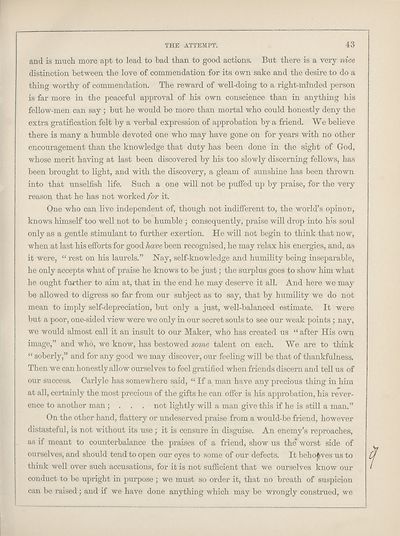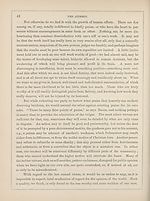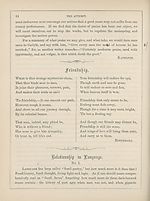Download files
Complete book:
Individual page:
Thumbnail gallery: Grid view | List view

THE ATTEMPT. 43
and is much more apt to lead to bad than to good actions. But there is a very mce
distinction between the love of commendation for its own sake and the desire to do a
thing worthy of commendation. The reward of well-doing to a right-minded person
is far more in the peaceful approval of his own conscience than in anything his
fellow-men can say ; but he would be more than mortal who could honestly deny the
extra gratification felt by a verbal expression of approbation by a friend. We believe
there is many a humble devoted one who may have gone on for years with no other
encouragement than the knowledge that duty has been done in the sight of God,
whose merit having at last been discovered by his too slowly discerning fellows, has
been brought to light, and with the discovery, a gleam of sunshine has been thrown
into that unselfish life. Such a one will not be jniffed up by praise, for the very
reason that he has not worked for it.
One who can live independent of, though not indifferent to, the world's opinon,
knows himself too well not to be humble ; consequently, praise will drop into his soul
only as a gentle stimulant to further exertion. He will not begin to think that now,
when at last his efforts for good have been recognised, he may relax his energies, and, as
it were, " rest on his laurels." Nay, self-knowledge and humility being inseparable,
he only accepts what of praise he knows to be just; the surplus goes to show him what
he ought further to aim at, that in the end he may deserve it all. And here we may
be allowed to digress so far from our subject as to say, that by humility we do not
mean to imply self-depreciation, but only a just, well-balanced estimate. It were
but a poor, one-sided view were we only in our secret souls to see our weak points; nay,
we would almost call it an insult to our Maker, who has created us " after His own
image," and who, we know, has bestowed some talent on each. We are to think
" soberly," and for any good we may discover, our feeling will be that of thankfulness.
Then we can honestly allow ourselves to feel gratified when friends discern and tell us of
our success. Carlyle has somewhere said, " If a man have any precious thing in him
at all, certainly the most precious of the gifts he can offer is his approbation, his rever¬
ence to another man; . . . not lightly will a man give this if he is still a man."
On the other hand, flattery or undeserved praise from a would-be friend, however
distasteful, is not without its use; it is censure in disguise. An enemy's reproaches,
as if meant to counterbalance the praises of a friend, show us the' worst side of
ourselves, and should tend to open our eyes to some of our defects. It behooves us to
think well over such accusations, for it is not sufficient that we ourselves know our
conduct to be upright in purpose; we must so order it, that no breath of suspicion
can be raised; and if we have done anything which may be wrongly construed, we
and is much more apt to lead to bad than to good actions. But there is a very mce
distinction between the love of commendation for its own sake and the desire to do a
thing worthy of commendation. The reward of well-doing to a right-minded person
is far more in the peaceful approval of his own conscience than in anything his
fellow-men can say ; but he would be more than mortal who could honestly deny the
extra gratification felt by a verbal expression of approbation by a friend. We believe
there is many a humble devoted one who may have gone on for years with no other
encouragement than the knowledge that duty has been done in the sight of God,
whose merit having at last been discovered by his too slowly discerning fellows, has
been brought to light, and with the discovery, a gleam of sunshine has been thrown
into that unselfish life. Such a one will not be jniffed up by praise, for the very
reason that he has not worked for it.
One who can live independent of, though not indifferent to, the world's opinon,
knows himself too well not to be humble ; consequently, praise will drop into his soul
only as a gentle stimulant to further exertion. He will not begin to think that now,
when at last his efforts for good have been recognised, he may relax his energies, and, as
it were, " rest on his laurels." Nay, self-knowledge and humility being inseparable,
he only accepts what of praise he knows to be just; the surplus goes to show him what
he ought further to aim at, that in the end he may deserve it all. And here we may
be allowed to digress so far from our subject as to say, that by humility we do not
mean to imply self-depreciation, but only a just, well-balanced estimate. It were
but a poor, one-sided view were we only in our secret souls to see our weak points; nay,
we would almost call it an insult to our Maker, who has created us " after His own
image," and who, we know, has bestowed some talent on each. We are to think
" soberly," and for any good we may discover, our feeling will be that of thankfulness.
Then we can honestly allow ourselves to feel gratified when friends discern and tell us of
our success. Carlyle has somewhere said, " If a man have any precious thing in him
at all, certainly the most precious of the gifts he can offer is his approbation, his rever¬
ence to another man; . . . not lightly will a man give this if he is still a man."
On the other hand, flattery or undeserved praise from a would-be friend, however
distasteful, is not without its use; it is censure in disguise. An enemy's reproaches,
as if meant to counterbalance the praises of a friend, show us the' worst side of
ourselves, and should tend to open our eyes to some of our defects. It behooves us to
think well over such accusations, for it is not sufficient that we ourselves know our
conduct to be upright in purpose; we must so order it, that no breath of suspicion
can be raised; and if we have done anything which may be wrongly construed, we
Set display mode to: Large image | Transcription
Images and transcriptions on this page, including medium image downloads, may be used under the Creative Commons Attribution 4.0 International Licence unless otherwise stated. ![]()
| Ladies' Edinburgh Debating Society publications > Attempt > Volume 3 > (57) Page 43 |
|---|
| Permanent URL | https://digital.nls.uk/104343916 |
|---|
| Attribution and copyright: |
|
|---|

